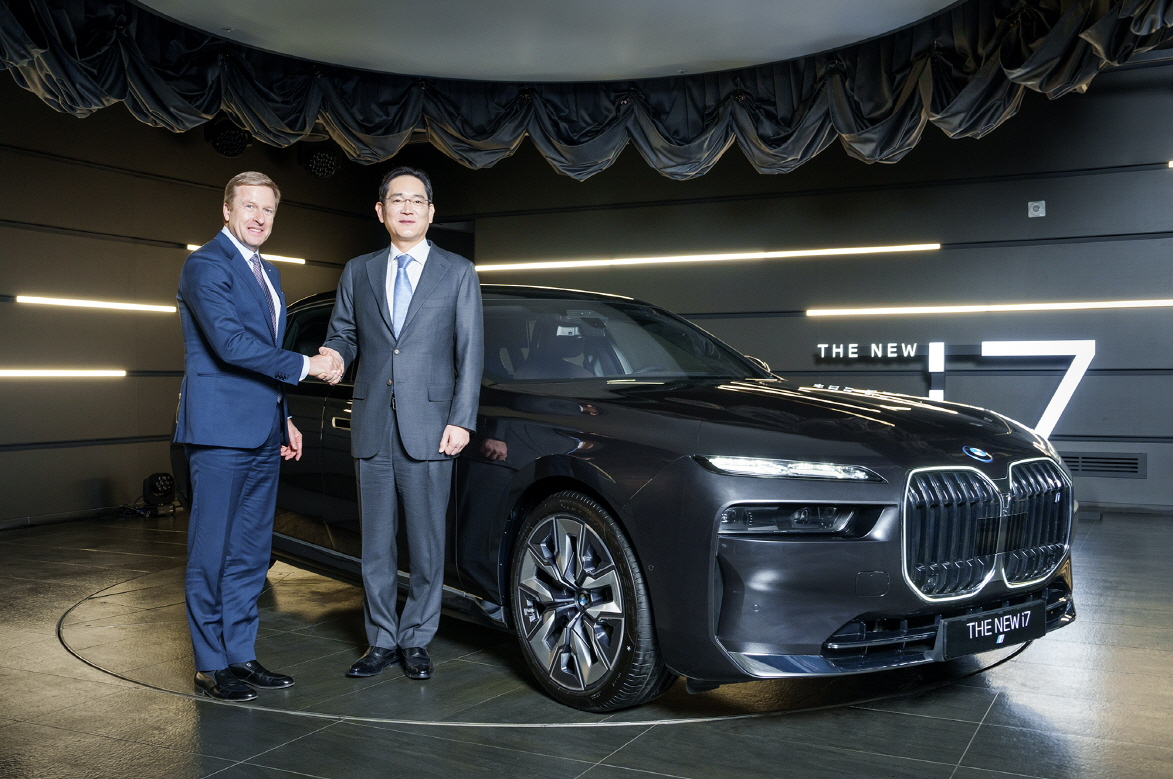 |
BMW Group CEO Oliver Zipse (left) and Samsung Electronics Chairman Lee Jae-yong shake hands during a handover ceremony of 10 units of BMW New i7 at the BMW driving center in Yeongjongdo, Incheon, on Saturday. (Samsung Electronics) |
Chief executives of Samsung Electronics and BMW Group, two leading business moguls in tech and automotive industries, met on Saturday to strengthen their electric vehicle battery alliance.
Samsung Electronics Chairman Lee Jae-yong met with BMW Group Chairman Oliver Zipse at BMW’s driving center in Incheon to discuss further measures to facilitate collaboration, according to the Korean tech giant. It is the second time the two have met since Lee's business trip to Europe in July.
“I am happy to work with BMW Group. Let's boost our partnership in the future as well,” said Lee in a statement. Zipse stressed that Samsung is a key partner in the automotive industry.
Before the business meeting, the two chiefs participated in a handover ceremony of 10 BMW New i7s, its first flagship EV sedan, for Samsung affiliate CEOs.
“Samsung SDI CEO Choi Yoon-ho will be using the first New i7. Owners of the other nine cars are not decided yet,” said an official from Samsung Electronics.
The New i7 is packed with Samsung’s Generation 5 batteries which increased the percentage of nickel in cathodes to over 88 percent to boost the car's energy density and overall driving range, compared to previous battery cells.
Samsung and BMW’s partnership traces back to 2009 when the two first announced they would work together on developing EV batteries.
Starting in 2013 with the i3, BMW’s first EV was followed by the i8, the iX and the i4 -- all packed with Samsung SDI’s high-performance lithium-ion batteries. Both iX and i4 installed Generation 5 batteries.
In 2014, the two cemented their partnership with a commitment to expand the supply of battery cells and overseas business, and develop new battery materials.
Five years later, Samsung SDI signed another deal with BMW to supply 4 trillion won ($3.05 billion) worth of EV batteries for the next 10 years. Currently, the battery giant has increased the amount three-fold -- a larger scale than expected -- driven by the burgeoning EV market.
Despite the defects in Samsung SDI’s battery cells reported by the US National Highway Traffic Safety Administration in August, the partnership between the two seems unshakable. BMW issued a recall for a total of 83 units of EVs including BMW i4 eDrive40 and i4 M50 manufactured in 2022 and iX xDrive50 and iX M60 produced between 2022-2023 citing a potential risk for battery fires.
Aside from BMW, other carmakers close to Samsung SDI include Volkswagen, Stellantis, Ford, Rivian and Lucid.
The battery giant recently vowed to produce next-generation cylindrical battery cells, hinting it will broaden its client base. The battery with a diameter of 46 millimeters increases energy capacity by five-fold and output by six-fold compared to the existing batteries in 21 millimeters.
Its key partner, BMW’s next-generation EV platform Neue Klasse recently announced it will use cylindrical batteries that are 46 millimeters in diameter with two different heights -- 120 millimeters for SUVs and 95 millimeters for sedans, according to the UK-based Car Magazine. Tesla is mostly using 46 millimeter width and 80 millimeter height batteries.
Samsung SDI has not decided on the height of the battery it will produce next year, according to the company official. “We have not had talks with Tesla on the matter, but the door is always open.”







![[Today’s K-pop] Blackpink’s Jennie, Lisa invited to Coachella as solo acts](http://res.heraldm.com/phpwas/restmb_idxmake.php?idx=644&simg=/content/image/2024/11/21/20241121050099_0.jpg)